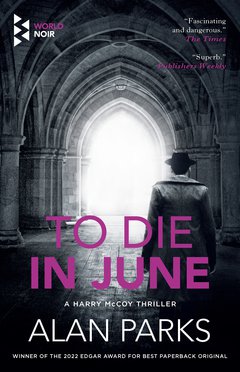Alan Parks
To Die in June
The book
From the winner of the MWA Edgar Award for Best Paperback Original Mystery, Alan Parks, comes a new, gripping installment in the gritty Glasgow-based Harry McCoy series.
A woman enters a Glasgow police station to report her son missing, but no record can be found of the boy. When Detective Harry McCoy, who is on temporary transfer from a station across town, discovers the family is part of the cultish Church of Christ’s Suffering, he suspects there is more to the boy’s disappearance than meets the eye.
Meanwhile reports arrive of a string of poisonings of down-and-outs across the city. The dead are men who few barely notice, let alone care about—but, as McCoy is painfully aware, among this desperate community is his own father.
Even as McCoy searches for the missing boy, he must conceal from his colleagues the real reason for his presence—to investigate corruption in the station. Some people pray for justice, but Detective Harry McCoy hasn't got time to wait for God’s divine intervention.
The author
Alan Parks
Before beginning his writing career, Alan Parks was Creative Director at London Records and Warner Music, where he marketed and managed artists including All Saints, New Order, The Streets, Gnarls Barkley, and Cee Lo Green. His love of music, musician lore, and even the industry, comes through in his prize-winning mysteries, which are saturated with the atmosphere of the 1970s music scene, grubby and drug-addled as it often was. Parks’ debut novel, Bloody January, propelled him onto the international literary crime fiction circuit and won him praise, prizes, and success with readers. The second book in the Harry McCoy series, February’s Son, was a finalist for a MWA Edgar Award. Parks was born in Scotland, earned an M.A. in Moral Philosophy from the University of Glasgow, and still lives and works in the city he so vividly depicts in his Harry McCoy thrillers.



